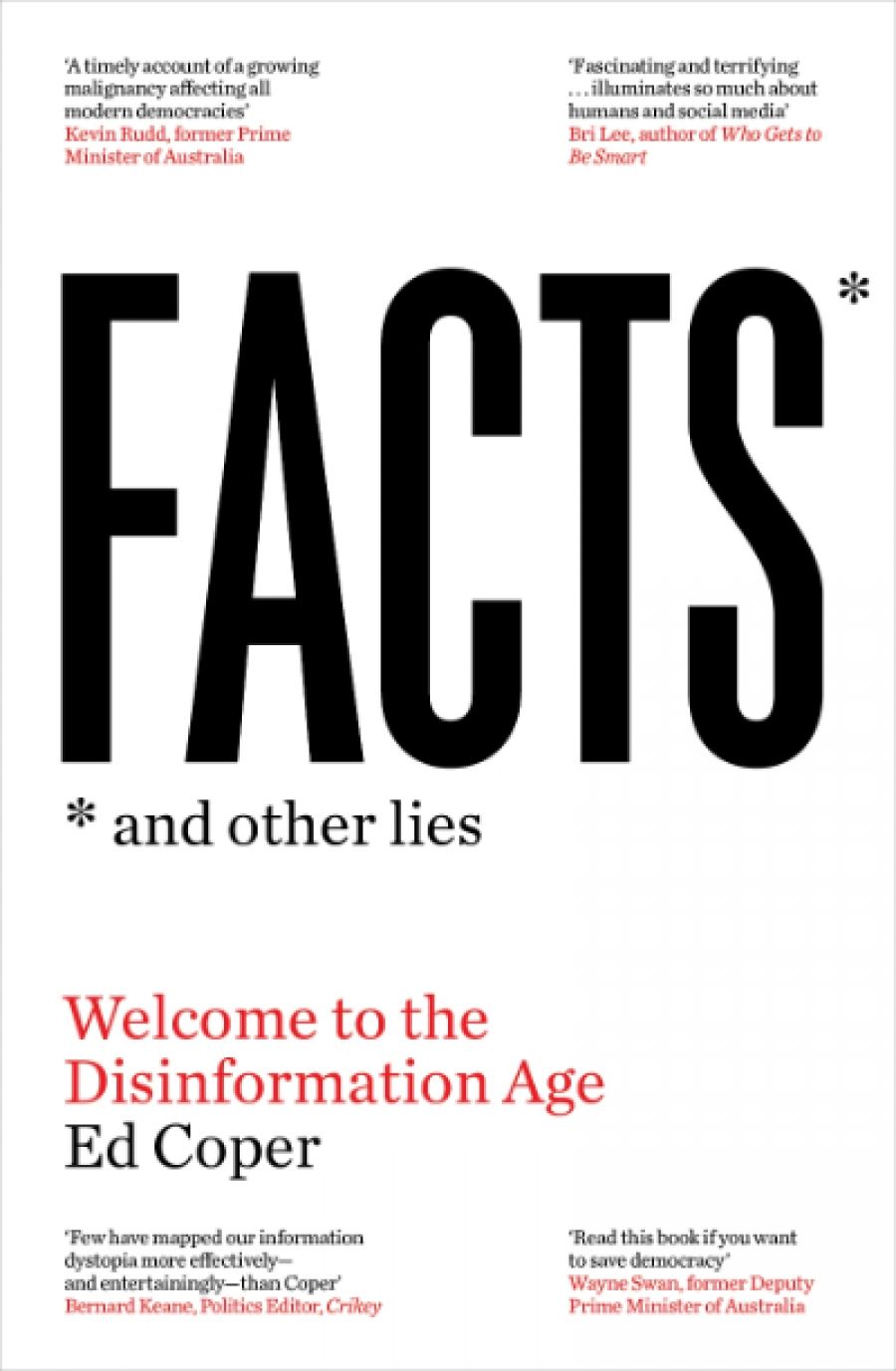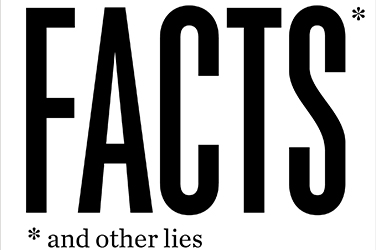
- Free Article: No
- Contents Category: Politics
- Review Article: Yes
- Article Title: Irreversibly complicated
- Article Subtitle: Explaining the ‘information ecosystem’
- Online Only: No
- Custom Highlight Text:
On 9 March 2022, Russian forces at war in Ukraine bombed a maternity hospital in the city of Mariupol, killing three and injuring seventeen. In a confused response to international condemnation, Russia denied responsibility, designating these denunciations ‘information terrorism’ and ‘fake news’.
- Featured Image (400px * 250px):

- Alt Tag (Featured Image): David Ferrell reviews 'Facts and Other Lies: Welcome to the disinformation age' by Ed Coper
- Book 1 Title: Facts and Other Lies
- Book 1 Subtitle: Welcome to the disinformation age
- Book 1 Biblio: Allen & Unwin, $32.99 pb, 400 pp
- Book 1 Readings Link: booktopia.kh4ffx.net/e42141
Truth, reason, and discourse are the bricks and mortar of democracy. And yet, here we are. Fake news, social media echo chambers, riotous division wracking the United States, the fracturing of society into sects of competing truths, unable even to converse. Democracy’s foundations seem to have betrayed us, or, in a moment of technological apotheosis, to have been revealed as something different from what we ever imagined. So much for the end of history. Says communications expert Ed Coper, ‘Welcome to the Disinformation Age’.
Coper’s new book, Facts and Other Lies, sets out to explain the modern, malfunctioning ‘information ecosystem’, to situate it in the context of compromised truth, and to offer strategies for ‘defeating disinformation’. The result is a stimulating, challenging, and multidisciplinary examination of the constitutional crisis of modernity.
The foundational assertion of Facts and Other Lies is that truth and reason are irreversibly complicated in our contemporary ‘information ecosystem’. Opening with a series of compelling histories – ‘of Lies’, ‘of Truth’, ‘of News’ – Coper tracks the emergence of an infrastructure of societal truth-making primed for disinformation, and introduces a critique of truth and reason, drawing on the work of philosophers like Hannah Arendt. ‘What scholars are failing to see,’ Coper writes, ‘is that of course there has never been a single accepted truth of anything.’ That rational thought, truth, and belief, under the microscope of philosophy and cognitive science, are in fact irrational and tribal underscores the book’s Nietzschean conviction: ‘our instincts tell us to go backwards. To reclaim something we have lost by elevating a golden age of truth that never really existed. [...] Instead, we need to move forwards.’
Over the course of the subsequent 350-odd pages, Coper categorises key mechanics of the ‘disinformation ecosystem’: ‘Fake Accounts’, ‘Fake Articles’, fake voices in fake online conversations that accumulate algorithmically-curated bubbles of ‘Fake Reality’. He ventures into political commentary – an illustrative analysis of the disinformation dynamics in the 2016 and 2020 US elections – and even into pop psychology, investigating the drives that are nitrous in the engine of disinformation. These modal shifts can make Facts and Other Lies feel like many books rolled into one, and yet amid clear, amusing, and stimulating commentary, they are well synthesised into the portrait Coper paints of a near-inevitable ‘perfect storm’.
Facts and Other Lies is ultimately propelled by the question of how to ‘defeat disinformation’. The solutions proposed in the book’s final parts centre around individuals’ finding common ground and de-oxygenating disinformation. Tactics include ‘innoculating’ individuals by teaching them the indicators of fake news, ‘prebunking’ claims that circulate online, and seeking common values to commence constructive dialogue.
Yet, committed to challenging the times on their own terms, Coper attends comparatively little to institutional solutions, preferring to strategise from within the malfunctioning ecosystem. In slightly under fifteen pages, he engages the question of what individuals, governments, and social media companies can do ‘Towards a Healthy Ecosystem’, including supporting local news media and regulating social media companies as ‘hybrid public-private utilities’, compared to the more than sixty pages attending to fighting disinformation in the current landscape.
Coper’s pragmatic conviction about restoring information balance captures the imperative of the post-truth world. Yet perhaps the most interesting questions to be found in this book are those kicked up in its wake; in particular, how does democracy move forward if it cannot escape the disinformation age?
Although Coper maintains a distinction between factual disinformation and mere truth narratives – tailoring his strategies to the suppression of the former, in order to facilitate genuine interface with the latter on common ground – his own analyses of truth, belief, and fact seem ambivalent about the tangible difference between fact and perspectival ‘truth’ on the scale of cultural belief. In such a frame, efforts to promote certain truths, and suppress others, carry the irksome spectre of mere narrative control.
Much of this book is convincingly dedicated to showing that techniques in the age of disinformation do not rely on ‘fact’ to succeed – they are tools of tribal belief. If the problem is one of a divergence of identity, of perspectives, of values, expressing itself in misty ‘truth’, does the cure threaten to suppress the chaotic differences of ‘truth’ that constitute democracy?
These questions are indicative of the exciting discussion Fact and Other Lies elicits. The contribution of Coper’s work to a clearer picture of our post-truth problematic lies as much in the tensions it reveals and attempts to navigate, by force of pragmatism, as in the strategies it develops. Perhaps, as Coper presents, the democratic foundations and technological reality are now at odds. Fictions about human nature will not prevail. Old truth has been unmasked, and the virtues of our previous world may only be saved by sacrificing expiring ideals. We may have to be pragmatic. Whether this is true – whether it is possible – whether the institutions we would save can themselves survive such sacrifices – readers must decide for themselves.


Comments powered by CComment